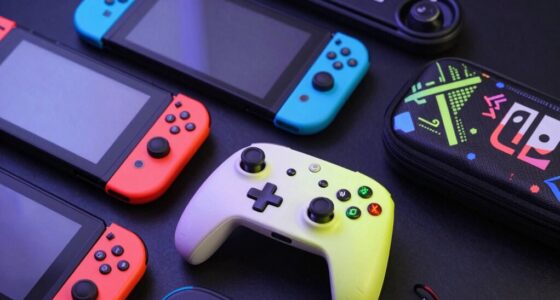If you’re looking for the best personal EKG devices compatible with smartphones for accurate heart monitoring, I recommend considering models like the KardiaMobile series, EMAY 6L, and Beurer Cardio Companion. These devices provide reliable, quick ECG recordings, often with FDA clearance, and connect seamlessly via Bluetooth or USB. They support easy data sharing with your doctor and feature user-friendly designs. To find out which one fits your needs best, keep going to learn more about each option.
Key Takeaways
- Look for FDA-cleared, portable EKG devices like KardiaMobile models that connect seamlessly via Bluetooth or USB to smartphones.
- Choose devices offering multiple lead options (1-lead, 6-lead) for comprehensive, accurate heart rhythm monitoring.
- Ensure compatibility with your smartphone’s OS (iOS or Android) and verify app availability in your region.
- Consider devices with built-in storage, quick measurement times, and user-friendly interfaces for reliable daily use.
- Evaluate subscription features for advanced analysis, professional review options, and data sharing capabilities with healthcare providers.
KardiaMobile 6-Lead Personal EKG Monitor
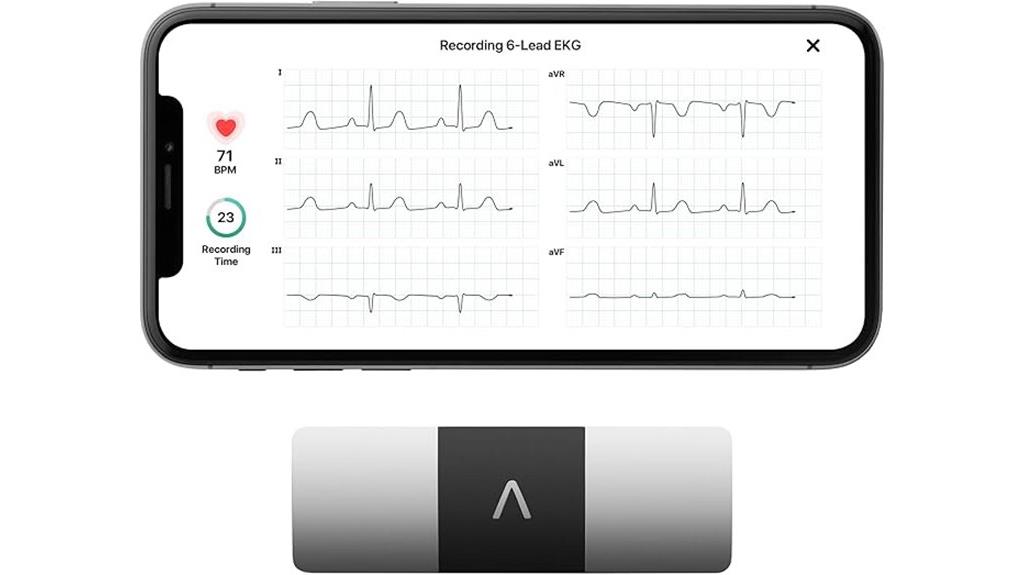
If you’re looking for a personal EKG device that provides detailed heart insights, the KardiaMobile 6-Lead is an excellent choice, especially for those needing accurate, medical-grade readings on the go. It offers six views of the heart, delivering fast, FDA-cleared rhythm analyses within 30 seconds. Compatible with most smartphones and tablets via the Kardia app, it doesn’t require a subscription for basic detection. Weighing just 24 grams and built from stainless steel and plastic, it’s portable and easy to use. Its high accuracy, backed by clinical comparisons, makes it suitable for continuous monitoring, field use, or quick diagnostics, giving you reliable heart health data anytime, anywhere.
Best For: individuals seeking a highly accurate, portable personal EKG device for proactive heart health monitoring, including patients over 50, those with arrhythmias, or remote healthcare providers.
Pros:
- Provides six-lead, medical-grade EKG recordings with FDA clearance for quick, reliable results.
- Compatible with most smartphones and tablets, with no subscription required for basic rhythm detection.
- Compact, lightweight design (24 grams) with a long battery life of approximately 200 hours, suitable for continuous or on-the-go monitoring.
Cons:
- Advanced analysis features often require a paid subscription, which may be viewed as intrusive or pushy by some users.
- The app can be overly aggressive with upgrade prompts, potentially affecting user experience.
- Unofficial modifications like snap-on leads are not FDA-certified and may affect device safety or accuracy if used improperly.
KardiaMobile 1-Lead Personal EKG Monitor
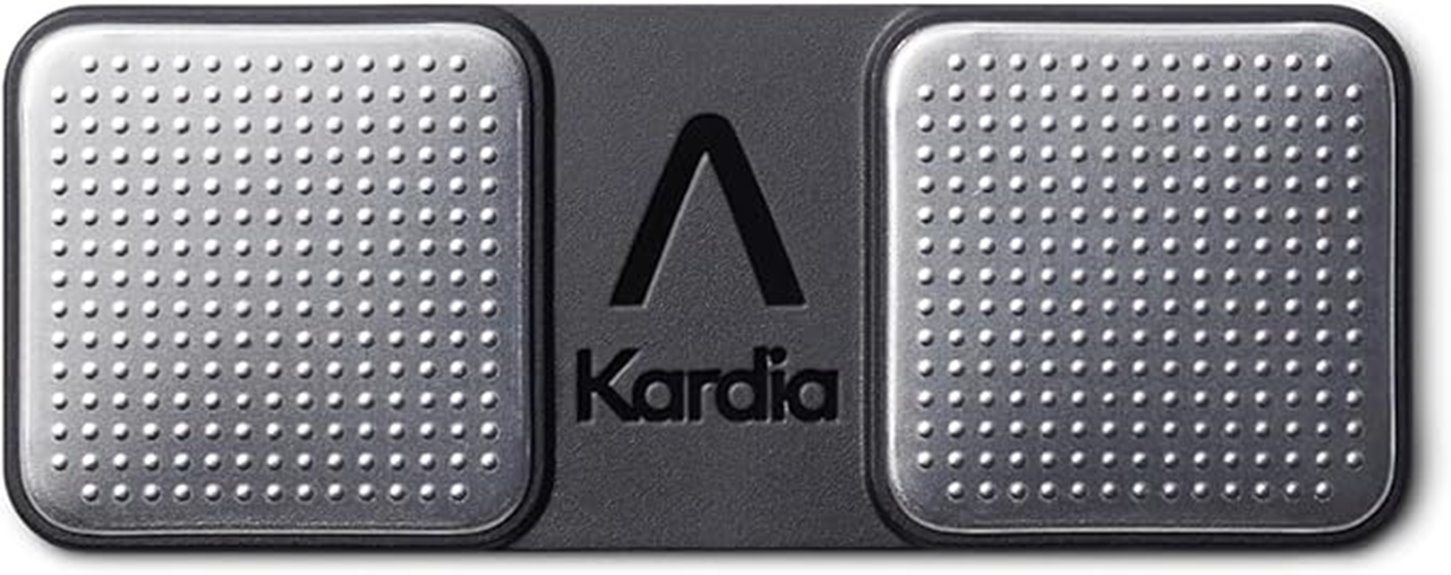
The KardiaMobile 1-Lead Personal EKG Monitor is ideal for individuals who want quick, medical-grade heart rhythm assessments from home. It records an EKG in just 30 seconds and provides instant analysis through a compatible smartphone app. Easy to use—just place your fingers on the sensors—you get immediate results on atrial fibrillation, bradycardia, tachycardia, or normal rhythm. Compatible with most iOS and Android devices, it’s small enough to carry everywhere. While it doesn’t diagnose heart attacks or provide a full 12-lead EKG, it’s a reliable tool for rhythm monitoring. Plus, it’s FDA-cleared and well-rated, making it a popular choice for personal heart tracking.
Best For: individuals seeking quick, convenient rhythm monitoring and detection of arrhythmias at home using a compact, user-friendly device.
Pros:
- FDA-cleared and highly rated for accuracy in detecting atrial fibrillation and other rhythm abnormalities
- Portable and easy to operate with no buttons, suitable for use anywhere
- Compatible with most smartphones and tablets, with optional subscription for enhanced features
Cons:
- Cannot diagnose heart attacks or provide a full 12-lead EKG—limits comprehensive cardiac assessment
- Initial setup requires review by medical professionals, which may delay immediate use
- Not recommended for use with pacemakers or ICDs, and some users report initial erratic readings without proper contact methods
KardiaMobile 6-Lead Personal EKG Monitor
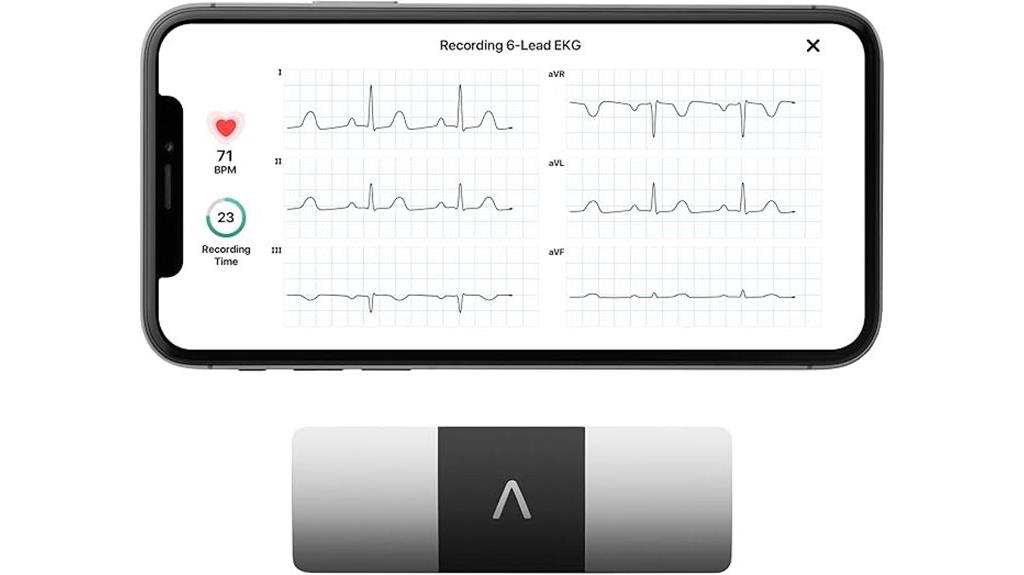
The KardiaMobile 6-Lead Personal EKG Monitor stands out as an ideal choice for individuals who want detailed, medical-grade heart monitoring on the go. It provides six views of your heart, delivering fast, FDA-cleared rhythm results in just 30 seconds. It detects AFib, bradycardia, tachycardia, and normal sinus rhythm, matching traditional 12-lead EKGs in accuracy. Compatible with most smartphones and tablets via the Kardia app, it’s lightweight and portable. While basic features are free, advanced analysis requires a subscription. Trusted by healthcare professionals, it’s perfect for continuous monitoring, remote use, and those seeking early detection of arrhythmias.
Best For: individuals seeking accurate, portable, and detailed personal heart monitoring, especially those with arrhythmia risks or needing remote cardiac assessment.
Pros:
- Provides six views of the heart with FDA-cleared, medical-grade results in just 30 seconds.
- Compatible with most smartphones and tablets, offering easy and quick access to ECG data.
- Trusted by healthcare professionals and suitable for continuous monitoring, field use, and early detection.
Cons:
- Advanced analysis features often require a paid subscription, which can be perceived as intrusive or costly.
- Some users find the app’s frequent upgrade prompts disruptive to their experience.
- Modifications like unofficial wire leads are not FDA-certified and may affect device safety or reliability.
EMAY 6L Portable ECG Monitor
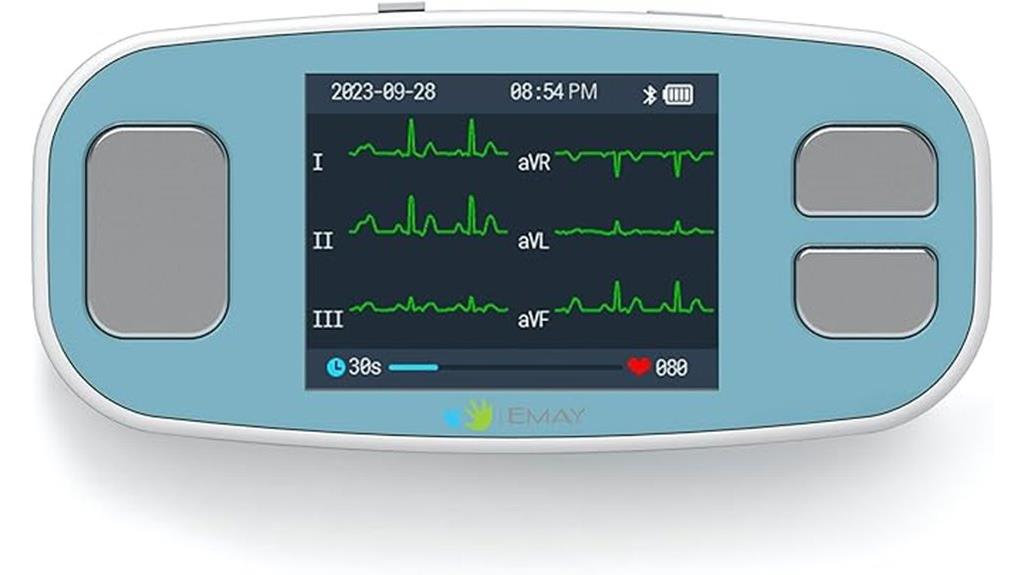
Looking for a portable ECG device that offers accurate heart monitoring without complicated subscriptions? The EMAY 6L Portable ECG Monitor might be just what you need. It records ECG signals, displays heart rate, and stores data for easy sharing with your doctor—all without hidden fees. Compatible with both iOS and Android smartphones, as well as PCs via Bluetooth or USB, it’s simple to use at home. Weighing only 85 grams with a durable design, it captures 6-channel ECG signals and features a clear 2.4-inch screen. Perfect for detecting arrhythmias like PVCs, it provides peace of mind and easy health tracking.
Best For: individuals seeking a portable, easy-to-use ECG device for home monitoring and early detection of heart rhythm issues without ongoing subscription costs.
Pros:
- No subscription or hidden fees required, providing cost-effective health tracking
- Compatible with both smartphones and PCs via Bluetooth or USB for flexible connectivity
- Lightweight (85 grams) with a durable design and clear display for convenient use at home
Cons:
- Not suitable for users with implanted pacemakers or as a replacement for professional hospital-grade ECG devices
- May require multiple attempts or assistance for proper contact, especially for elderly or mobility-impaired users
- Should be used as a supplementary tool alongside professional medical advice, not for definitive diagnosis
EMAY Portable ECG Monitor

If you’re seeking a portable, easy-to-use ECG device that delivers reliable heart monitoring at home, the EMAY Portable ECG Monitor stands out. It records and stores Lead I ECG signals, displays heart rate, and connects via Bluetooth to your smartphone or USB to your PC. Its compact size, lightweight design, and metal body make it highly portable. The device captures 30-second ECG readings, generates detailed reports, and allows easy sharing through apps. Powered by a rechargeable battery, it’s simple to operate with clear instructions. Customers praise its accuracy and convenience, especially for monitoring conditions like A-Fib, making it a practical tool for everyday heart health tracking.
Best For: individuals seeking a portable, easy-to-use ECG device for reliable at-home heart monitoring and quick report sharing.
Pros:
- Compact, lightweight, and metal construction for portability and durability
- Easy Bluetooth and USB connectivity with detailed app support for report review and sharing
- Accurate 30-second ECG recordings suitable for monitoring conditions like A-Fib
Cons:
- Small screen size may require pairing with a smartphone for optimal readability
- Some users experience initial difficulty turning on or establishing connections, needing troubleshooting
- Manual instructions could be clearer regarding proper placement and device operation
KardiaMobile 1-Lead Personal EKG Monitor
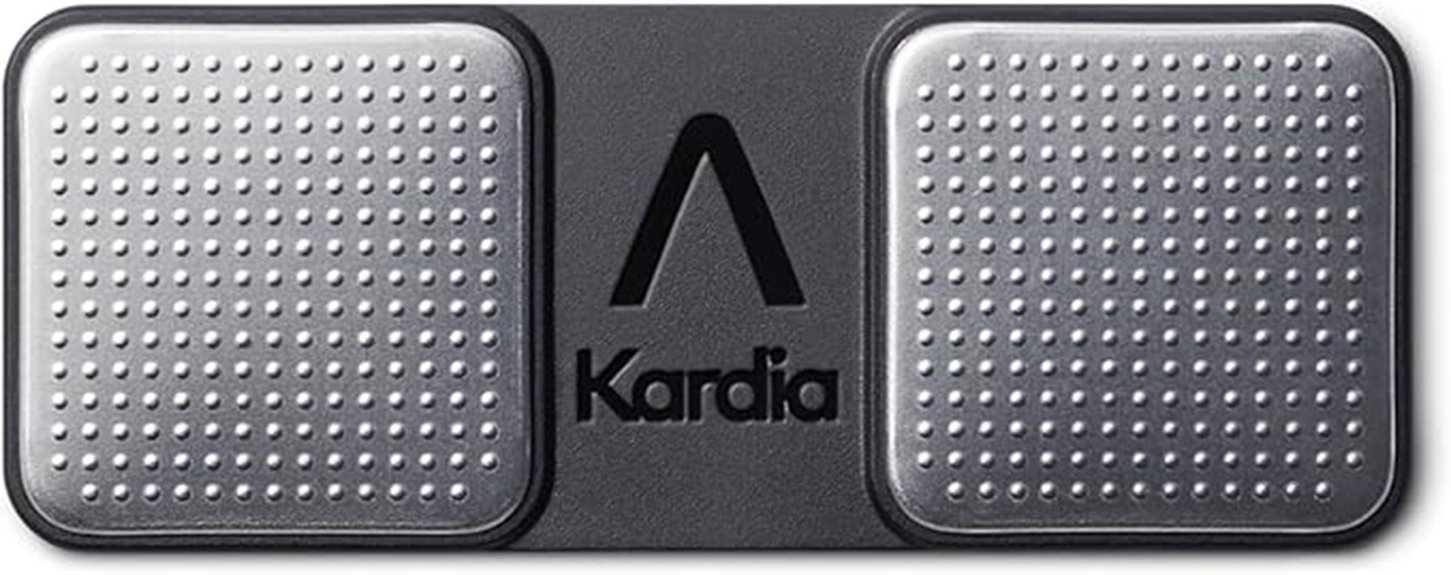
For those who want a quick and easy way to monitor their heart rhythm at home, the KardiaMobile 1-Lead Personal EKG Monitor offers a convenient solution. It records medical-grade EKGs in just 30 seconds and works seamlessly with most smartphones and tablets through the Kardia app. Compatible with iOS and Android devices, it’s compact, lightweight, and simple to operate—just place your fingers on the sensors. It detects arrhythmias like AFib, bradycardia, and tachycardia, providing instant results. While it’s FDA-cleared and popular among users, it’s important to remember it only offers rhythm data, not full diagnoses or heart attack detection.
Best For: individuals seeking a portable, easy-to-use device for monitoring heart rhythm at home, particularly those with intermittent arrhythmias or looking for quick, convenient rhythm checks.
Pros:
- Compact, lightweight design that easily fits in a pocket or bag
- Simple operation with no buttons—just place fingers on sensors and wait 30 seconds
- FDA-cleared and widely recommended for rhythm monitoring, providing quick, medical-grade EKG recordings
Cons:
- Cannot diagnose heart attacks or provide a full 12-lead EKG; only rhythm data is available
- Initial setup requires review by medical professionals, taking approximately 20 hours before first use
- Limited functionality without a subscription, requiring paid KardiaCare plan for detailed analysis and data storage
KardiaMobile 6L Max Personal EKG Monitor with Subscription
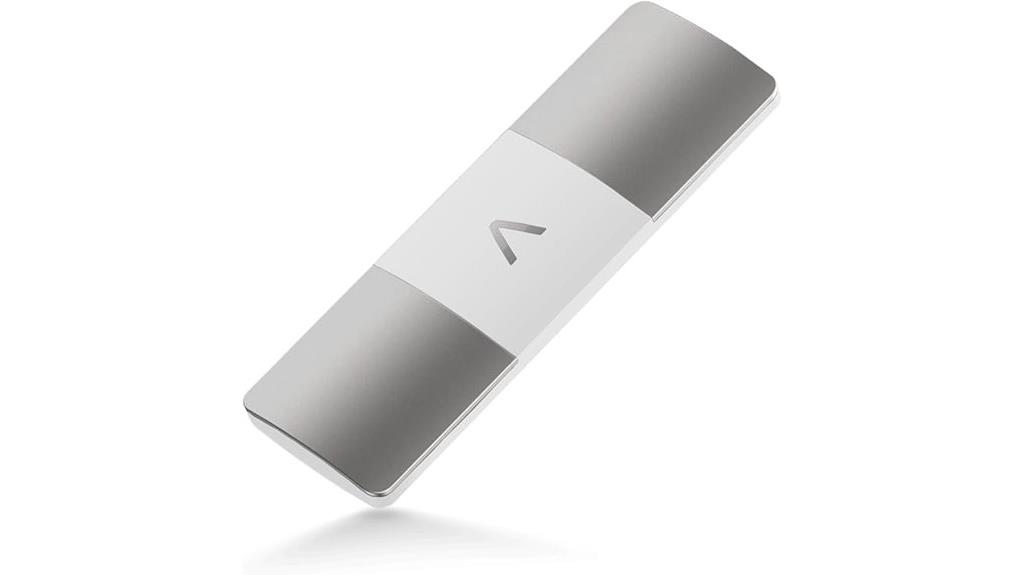
The KardiaMobile 6L Max Personal EKG Monitor with Subscription is ideal for anyone who needs accurate, multi-lead heart monitoring on the go. It captures six-lead ECG recordings in about 30 seconds, detecting common arrhythmias like atrial fibrillation, bradycardia, and tachycardia. Compact and durable, it connects seamlessly with smartphones and offers detailed trend analysis, automatic alerts, and easy data sharing with healthcare providers. Included with a 12-month subscription, users get AI-generated reports, cardiologist reviews, and insights to track their heart health over time. It’s highly recommended by cardiologists, though not suitable for pacemaker users or for detecting heart attacks.
Best For: individuals seeking accurate, multi-lead ECG monitoring and detailed heart health insights on the go, especially those with irregular heart rhythms or concerns requiring professional review.
Pros:
- Provides 6-lead ECG recordings in approximately 30 seconds for comprehensive heart monitoring.
- Includes a 12-month subscription with AI-generated reports and cardiologist reviews, enhancing diagnostic confidence.
- Compact, durable, and easy to connect with smartphones for quick, on-demand use.
Cons:
- Not suitable for users with pacemakers or implantable cardioverter-defibrillators (ICDs).
- Regional compatibility issues may require VPNs or US-based accounts in some countries.
- Some users experience connectivity or reliability issues, such as failed recordings or app glitches.
EKG Monitor Device, Personal Heart Rate Monitor with LCD Screen
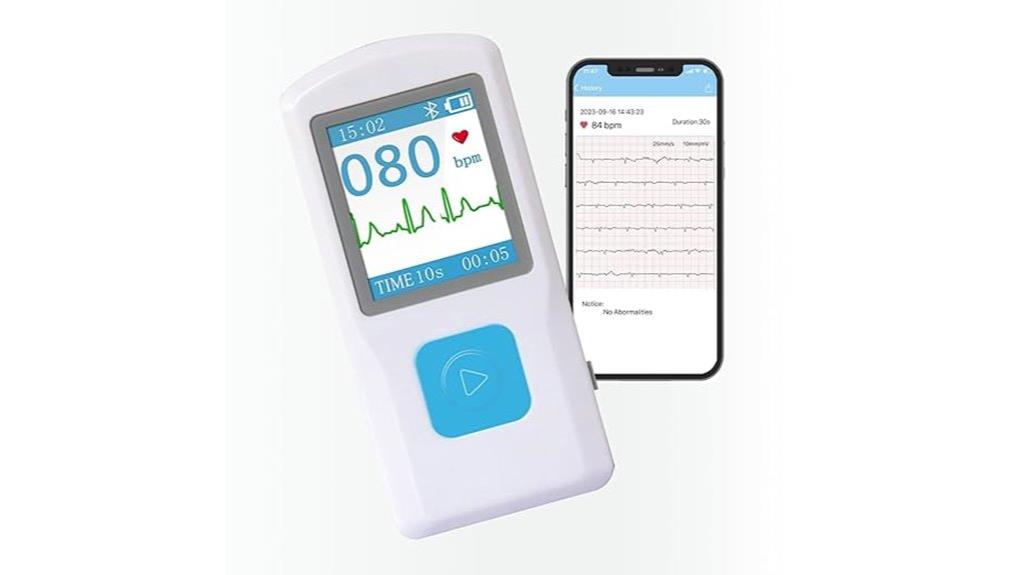
A personal EKG device with an LCD screen is ideal for individuals seeking quick, reliable heart monitoring on the go. Weighing only 60 grams, it’s compact, rechargeable, and fits comfortably in my hand. The bright LCD display shows instant ECG results, making it easy to track my heart health anytime. It offers multiple modes—Hand to Hand, Hand to Chest, Hand to Leg—for versatile monitoring. Compatible with both smartphones and PCs, I can easily transfer data for analysis or sharing. Its sturdy build, long battery life, and user-friendly interface make it a practical choice for ongoing heart health monitoring, especially for those who want professional-grade data in a portable package.
Best For: individuals seeking a portable, easy-to-use ECG device for quick heart monitoring and early detection of heart issues on the go.
Pros:
- Compact, lightweight design weighing only 60g for portability and convenience
- Instant ECG readings displayed on a bright LCD screen for easy interpretation
- Compatible with smartphones and PCs, enabling seamless data sharing and analysis
Cons:
- Limited IOS compatibility and only one-lead functionality may restrict comprehensive medical analysis
- Not suitable for detailed professional diagnosis compared to advanced medical devices
- Basic features may not meet the needs of healthcare professionals requiring more in-depth data
KardiaMobile Personal EKG Device
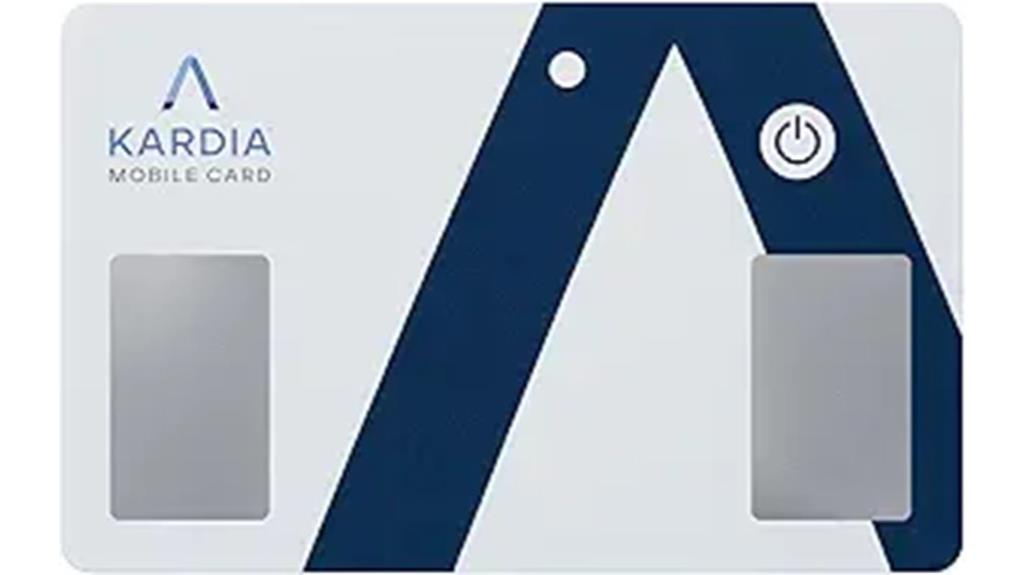
If you’re looking for a reliable, portable way to monitor your heart rhythm on the go, the KardiaMobile Personal EKG Device stands out as an excellent choice. This slim, credit card-sized device records single-lead ECGs in seconds and connects effortlessly via Bluetooth to most smartphones and tablets. It’s FDA-cleared and doctor-recommended, capable of detecting arrhythmias like AFib, Bradycardia, and Tachycardia. Easy to use—just place your fingers on the sensors—it provides accurate results without needing WiFi. Its durability and long battery life make it perfect for everyday monitoring, helping you stay on top of your heart health wherever you are.
Best For: individuals seeking a portable, easy-to-use device for real-time heart rhythm monitoring and arrhythmia detection outside clinical settings.
Pros:
- Compact, credit card-sized design for portability and convenience
- Quick, accurate single-lead ECG recordings within seconds
- Compatible with most smartphones and tablets via Bluetooth, no WiFi needed
Cons:
- Limited support in some countries like Australia and New Zealand
- Connection issues or unsupported devices may occur for certain users
- Requires proper technique to minimize artifacts and ensure accurate readings
Portable EKG & Heart Rate Monitor with LCD Screen & Storage
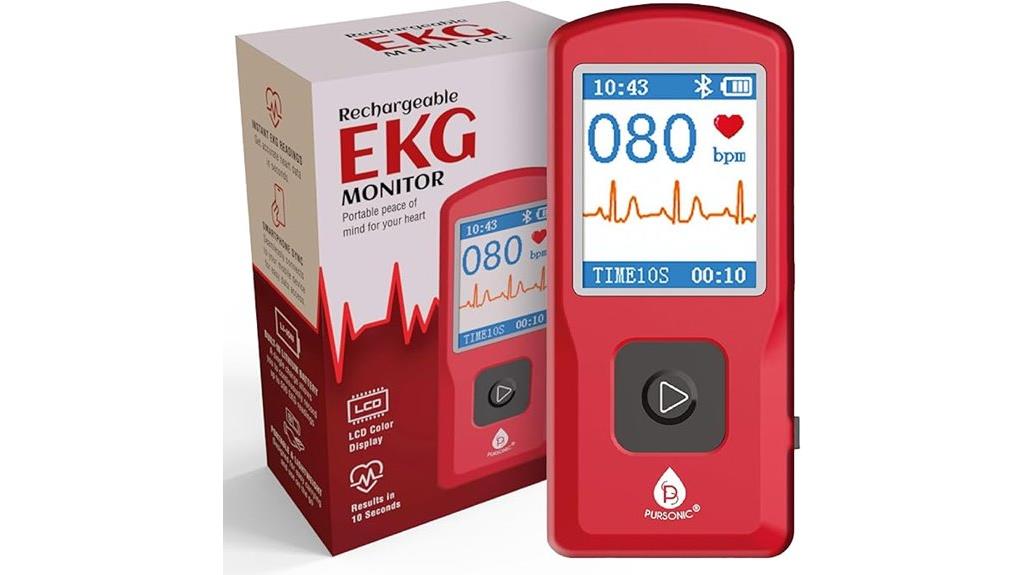
Looking for a reliable, standalone device to monitor your heart health anytime, anywhere? This portable EKG and heart rate monitor features an LCD screen and built-in storage, so you don’t need a smartphone or subscription. It quickly records 30-second ECGs and supports multiple positions—Hand-to-Hand, Hand-to-Chest, Hand-to-Leg—for accurate readings. You can store up to 100 measurements internally and easily sync data with a dedicated app or PC for detailed review. Compact and easy to use, it’s perfect for home monitoring. Just keep in mind, it’s not suitable for use with pacemakers or ICDs, but it offers trusted, hassle-free heart tracking.
Best For: individuals seeking a reliable, portable, and standalone device for convenient heart health monitoring at home or on the go without the need for a smartphone or subscription.
Pros:
- Easy to use and operate independently, no smartphone or subscription required
- Supports multiple recording positions for comprehensive and accurate readings
- Stores up to 100 measurements internally for easy tracking and review
Cons:
- Not suitable for use with pacemakers or ICDs
- Limited to 30-second ECG recordings, which may not capture longer-term heart activity
- Requires syncing with an app or PC for detailed data analysis, which may be less convenient for some users
Portable Heart Rate Monitor with Smartphone App for iOS/Android
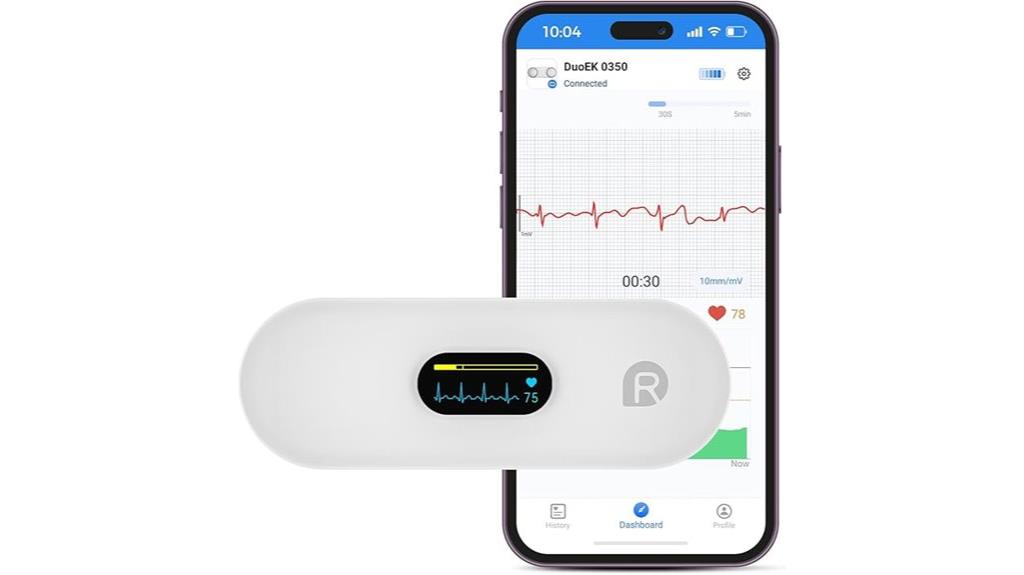
For anyone needing quick, reliable heart rate readings on the go, the Portable Heart Rate Monitor with Smartphone App offers a convenient solution. Its compact, lightweight design fits easily in your pocket, weighing just 0.06 pounds. Using contact sensors, it provides accurate results in 30 seconds through hand, ankle, or chest methods. The OLED screen displays rhythms instantly without needing a mobile device. Compatible with iOS and Android via USB-C, it records data to the app, stores it offline, and allows sharing with doctors. With a rechargeable battery supporting approximately 500 uses, it’s perfect for continuous, on-the-move heart monitoring.
Best For: individuals seeking a portable, quick, and reliable heart rate monitor for on-the-go tracking and health management.
Pros:
- Compact, lightweight design easily fits in pockets for convenience during daily activities or workouts
- Fast 30-second measurement with multiple contact methods ensures accurate and flexible heart rate monitoring
- Seamless app integration with AI analysis and data sharing capabilities enhances health tracking and remote consultation
Cons:
- Battery life may be limited for some users, with reports of less than 24-hour charge durations
- Lack of included straps or belts raises questions about its “wearable” designation for some users
- Customer support responsiveness appears inconsistent, potentially affecting user experience with technical issues
Portable EKG Monitor & Heart Rate Monitor with LCD Screen & Storage
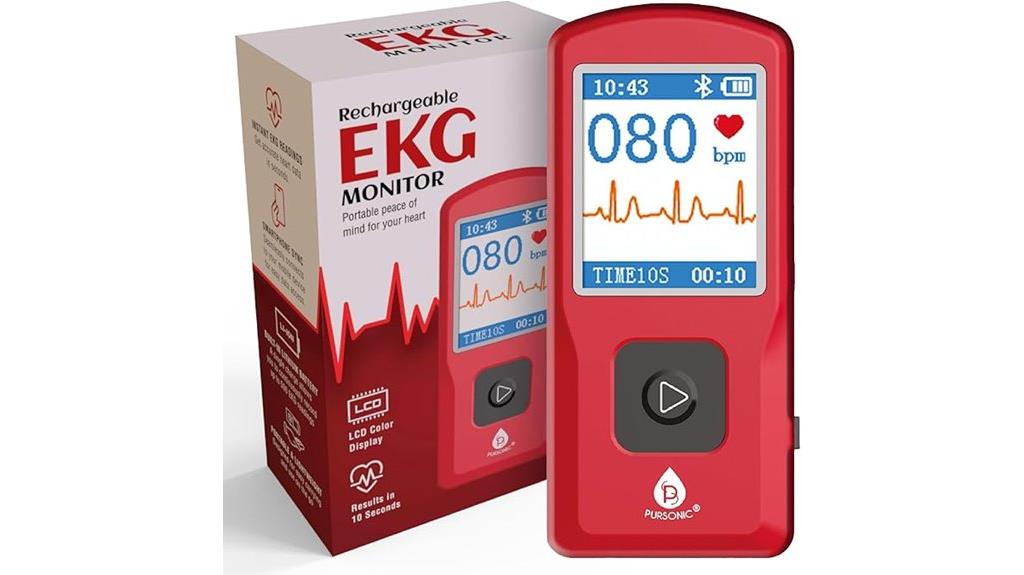
A portable EKG monitor with an LCD screen and built-in storage is an excellent choice for individuals who want reliable, on-the-go heart health tracking without relying on smartphones or subscriptions. This standalone device quickly records 30-second ECGs and heart rates in multiple positions, ensuring accurate, extensive readings. It can store up to 100 measurements internally and supports easy data transfer to a dedicated app or PC for detailed review. Compact and user-friendly, it’s perfect for home use and provides dependable monitoring without extra fees. Keep in mind, it’s not suitable for users with pacemakers or ICDs, but it offers straightforward, reliable heart tracking anytime you need it.
Best For: individuals seeking a reliable, standalone portable EKG and heart rate monitor for convenient, on-the-go heart health tracking without the need for smartphones or subscriptions.
Pros:
- Operates independently without requiring a smartphone or subscription fees
- Supports multiple recording positions for comprehensive heart health data
- Stores up to 100 readings internally for easy tracking and review
Cons:
- Not suitable for use with pacemakers or ICDs
- Limited to 30-second ECG recordings, which may not capture longer-term heart activity
- Requires manual data transfer to app or PC for detailed analysis
Ginsco Carrying Case for KardiaMobile 1-Lead Heart Monitor

The Ginsco Carrying Case is an ideal accessory for anyone who wants to protect their KardiaMobile 1-Lead Heart Monitor on the go. It’s designed to snugly fit the device and most smartphones, ensuring a secure fit. Made from durable 1680D Oxford fabric and EVA hard shell, it offers anti-shock, dust, splash, and scratch protection. The case includes a mesh compartment for cables and accessories, with an elastic strap to keep the monitor secure. Its lightweight, compact design and removable strap make it perfect for travel, daily use, or slipping into a purse or backpack. Customer ratings are high, emphasizing its fit, protection, and ease of use.
Best For: individuals seeking durable, portable protection for their KardiaMobile 1-Lead Heart Monitor and accessories during travel or daily use.
Pros:
- Snug fit and secure elastic strap prevent device movement and damage
- Durable construction with shockproof, dust, splash, and scratch resistance
- Lightweight and compact, ideal for carrying in purses, backpacks, or luggage
Cons:
- Some users noted stitching issues with strap attachment durability
- Only the case is included; heart monitor and accessories are sold separately
- Limited color or style options available
Beurer Cardio Companion EKG Monitor

If you’re looking for a reliable, easy-to-use portable EKG device for at-home heart monitoring, the Beurer Cardio Companion EKG Monitor stands out. This German-engineered, 3-lead ECG device offers quick, accurate results in under 30 seconds, with four measurement options—hand-to-hand, finger-to-chest, finger-to-finger, and finger-to-leg—though the finger-to-chest method is recommended for best accuracy. It features a bright color display and a rechargeable USB battery, making it convenient for everyday use. The device can store 100 readings and connects via Bluetooth to a free app for trend tracking and detailed analysis. It’s perfect for monitoring heart health from home.
Best For: individuals seeking a reliable, easy-to-use portable EKG device for at-home heart monitoring and trend tracking.
Pros:
- Quick, accurate results in under 30 seconds with FDA clearance
- Compact, portable design with a bright color display and rechargeable USB battery
- Seamless Bluetooth connectivity with a free app for unlimited measurement storage and health trend analysis
Cons:
- Not suitable for users with pacemakers, metal implants, or electrical pulse-emitting implants
- Requires careful use to avoid skin contact during measurement for optimal accuracy
- Limited to 100 stored readings without app connectivity; more storage available through the app
EverOne Portable Bluetooth ECG Monitor (EVOPM10)
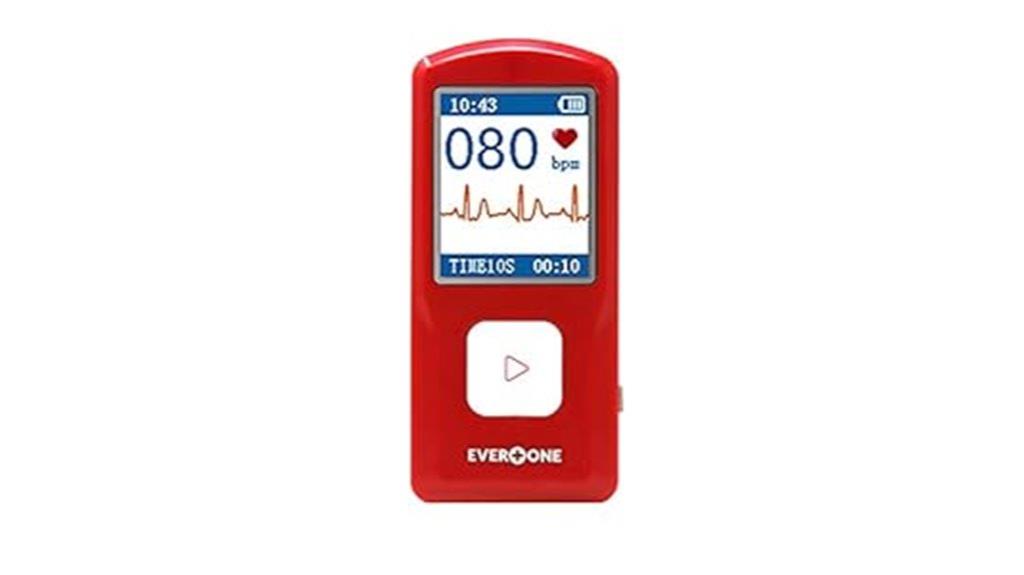
For anyone seeking a portable, wireless ECG monitor that’s compatible with multiple devices, the EverOne EVOPM10 stands out. It’s compact, lightweight, and features a 1.77-inch color display for clear readings. With Bluetooth connectivity, you can quickly get ECG results in 10-30 seconds from various body parts. The device works with iOS, Android, and Windows, and an app helps manage, share, and track your heart data. However, some users report challenges with Bluetooth connections and app compatibility, especially on Android and Windows 10. Despite this, its portability and ease of use make it a convenient option for personal heart monitoring.
Best For: individuals seeking a portable, wireless ECG device for personal heart monitoring who are comfortable troubleshooting minor connectivity issues.
Pros:
- Compact, lightweight design makes it highly portable and easy to carry
- Quick ECG readings in just 10-30 seconds from various body parts
- Compatible with multiple devices including iOS, Android, and Windows, with an app for data management
Cons:
- Bluetooth connectivity and app compatibility issues reported by some users, especially on Android and Windows 10
- Battery life may require frequent recharging, affecting readiness for urgent use
- Limited support materials and inconsistent software performance can lead to troubleshooting challenges
Factors to Consider When Choosing a Personal EKG Device Smartphone Compatible

When choosing a smartphone-compatible EKG device, I consider how well it works with my phone and its overall accuracy. I also look at how easy it is to use, how I can store my data, and how long the battery lasts. These factors help guarantee I get reliable heart monitoring without hassle.
Compatibility With Devices
Choosing a personal EKG device that’s compatible with your smartphone is essential to guarantee smooth operation and reliable monitoring. First, check that the device supports your phone’s operating system, whether iOS or Android. Verify the supported device models and software versions to ensure seamless connectivity. Pay attention to how the device connects—via Bluetooth, USB-C, or other methods—and confirm your phone or tablet supports that connection type. Also, see if the device requires specific app versions or software updates for peak functionality. Finally, consider regional restrictions or app availability, making sure both the device and its companion app are accessible in your location. Taking these steps helps you select a device that works effortlessly with your existing hardware.
Accuracy and Reliability
Ensuring your personal EKG device is accurate and reliable is essential for trustworthy heart monitoring. I look for devices with FDA clearance or equivalent certification, which guarantees they meet safety and accuracy standards. Clinically validated devices that produce results comparable to traditional 12-lead EKGs give me confidence in their readings. It’s also important that the device can detect multiple arrhythmias and abnormal rhythms with high sensitivity and specificity, guaranteeing I get comprehensive monitoring. I check user reviews and professional endorsements to see how well the device performs in real-world scenarios over time. Finally, I verify the accuracy of data transmission and storage, especially how seamlessly it integrates with apps and healthcare systems, to ensure my heart data is precise and reliable.
Ease of Use
A personal EKG device that’s easy to use can make heart monitoring less intimidating and more consistent. I look for devices with simple, intuitive operation—like just placing my fingers on sensors or connecting leads without hassle. Clear, easy-to-read displays and straightforward app interfaces help me navigate measurements quickly, even if I’m not tech-savvy. Features like automated prompts and guided tutorials are invaluable—they guarantee I get accurate readings and reduce errors. Compact, lightweight designs that fit comfortably in my hand or pocket encourage regular use. Quick measurement times, around 30 seconds, and minimal setup make it convenient to check my heart health regularly, without feeling overwhelmed or frustrated. Ease of use is essential for maintaining a consistent monitoring routine.
Data Storage Options
When selecting a personal EKG device, considering its data storage options is essential, especially if I want easy access to my heart data over time. Many devices offer internal storage that can hold 100 or more recordings, making it simple to review recent readings without needing extra devices. Cloud storage options are also common, often requiring a subscription, which allows me to back up and access ECG data securely from multiple devices. Some devices automatically sync recordings to companion apps or PC software, easing data management and sharing with healthcare providers. Offline storage on the device is typical but can limit long-term trend analysis unless I export or sync data regularly. Overall, storage options impact how easily I can monitor my heart health and keep my data secure.
Battery Life Duration
Long battery life is essential when choosing a personal EKG device, especially if I plan to monitor my heart regularly or use it in remote settings. A device that lasts multiple days or weeks without frequent recharging supports continuous monitoring and provides peace of mind. Devices with rechargeable batteries often support hundreds of measurements per charge, with some lasting up to 500+ uses before needing a recharge. The battery’s lifespan and cycle count directly influence reliability, particularly in emergencies. Quick recharge times and extended battery durations reduce downtime and make daily use more convenient. Additionally, a low battery indicator helps prevent unexpected power loss during critical readings or remote use, ensuring I can rely on my device whenever I need it most.
App Functionality and Support
Choosing a personal EKG device with a compatible smartphone app means paying close attention to the app’s features and usability. I look for apps that offer extensive functions like ECG recording, trend tracking, data exporting, and sharing options, which are essential for effective health management. The interface should be intuitive and reliable, with helpful tutorials, troubleshooting support, and regular updates to guarantee compatibility with my device’s operating system. I also check if the app can sync with other health devices, such as blood pressure monitors or fitness trackers, to get a complete picture of my cardiovascular health. Additionally, I consider whether advanced features require a subscription and if those features are necessary for my needs. Good customer support is a bonus, helping me resolve any technical issues quickly.
Frequently Asked Questions
How Accurate Are Personal EKG Devices Compared to Clinical ECGS?
You’re wondering how accurate personal EKG devices are compared to clinical ECGs. I’ve found that while these devices are quite reliable for detecting irregular heartbeats and monitoring heart health, they aren’t as thorough as a clinical ECG, which provides a detailed analysis. Personal devices are great for everyday use and early detection, but for precise diagnosis or treatment, I still trust a healthcare professional’s clinical ECG.
Can These Devices Detect Arrhythmias or Other Heart Conditions?
I know that some personal EKG devices can detect arrhythmias and other heart issues, but they’re not a substitute for professional diagnosis. These devices often have algorithms that alert you to irregular rhythms, which is helpful. However, I’d recommend always consulting a healthcare professional if you notice irregularities or symptoms. They can provide an extensive assessment and determine if further testing is needed.
What Are the Data Privacy and Security Measures for These Devices?
Imagine your heart’s data as a secret garden needing protection. I guarantee these devices use encryption to keep your info safe and comply with privacy laws like HIPAA. Regular security updates and user authentication add extra layers of defense. Rest assured, manufacturers prioritize your privacy, so your sensitive health data stays confidential, allowing you to monitor your heart with confidence and peace of mind.
Are These EKG Devices Suitable for Continuous Heart Monitoring?
I believe many personal EKG devices are suitable for continuous heart monitoring, especially those with ongoing data tracking features. They allow me to keep an eye on my heart health in real-time, alerting me to irregularities. However, I recommend checking each device’s specifications to verify they support continuous use and offer reliable, long-term monitoring capabilities, as some are designed more for spot checks than constant tracking.
How Often Should I Calibrate or Update My Personal EKG Device?
Did you know that regular updates can improve device accuracy by up to 20%? I recommend calibrating or updating your personal EKG device every three to six months, depending on usage and manufacturer guidelines. This helps guarantee the readings stay precise and reliable. Also, check for software updates promptly, as they often include essential improvements. Staying consistent with updates keeps your heart monitoring safe and effective.
Conclusion
Choosing the right personal EKG device can truly empower you to stay on top of your heart health. Did you know that early detection of arrhythmias with these devices can reduce stroke risk by up to 60%? With so many reliable options compatible with smartphones, you can monitor your heart anytime, anywhere. Investing in one of these tools could make a significant difference in catching issues early and giving you peace of mind.


